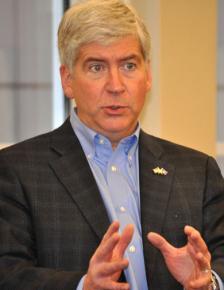More austerity ahead in Detroit
reports on the devastating economic crisis in Detroit--and why the governor's appointment of an "emergency manager" will make matters worse.
MICHIGAN GOV. Rick Snyder appointed an "emergency manager" for the city of Detroit, claiming the move will help improve the city and the lives of its residents. But rather than representing the interests of ordinary Detroiters, the emergency manager will represent the interests of private property and corporations, with painful outcomes for the vast majority of residents.
Michigan officials announced the appointment of Kevyn Orr as emergency manager on March 14. Orr, a bankruptcy lawyer, took in an estimated $1 million in fees during his first year handling the Chrysler bankruptcy in 2009. Jones Day law firm, where Orr works, represents Wells Fargo, which leads in foreclosures in the state of Michigan.
Jones Day also represents Amway Corp., which helped bankroll anti-union "right to work" legislation that was rammed through the Michigan legislature--plus Bank of America and Lehman Brothers, two banks at the center of the 2008 financial crisis.
According to the new state law that goes into effect on March 28--the same week that Orr takes over--the emergency manager will have sweeping powers to restructuring the city's financial plan, including changing existing collective bargaining contracts and selling off city assets.

Fundamentally, the job of emergency manager is to shift responsibility for capitalism's crisis away from bankers, CEOs and hedge-fund managers and onto the backs of the most vulnerable. In the case of Detroit, that means poor and working-class African Americans who make up the vast majority of the city's population.
Once the emergency manager takes over, 49 percent of Michigan's African American residents will be under emergency management, and therefore without elected leaders. Detroit will join Benton Harbor, Pontiac, Flint, Allen Park and the school districts of Detroit, Highland Park and Muskegon Heights, which are also being run by an emergency manager.
Once in place, he could strip local elected officials of all their power, effectively disenfranchising residents from the local political process. The powerless elected officials could then play a supporting or advisory role, but only if they "play ball" with the appointed emergency manager who holds ultimate authority.
The emergency manager will have near-dictatorial control over the city government, and may unilaterally cut, eliminate, sell or privatize city departments and assets, as well void or amend union contracts and pension obligations.
The effect on ordinary Detroiters will likely be devastating. Any cuts that the emergency manager makes to city services will be in addition to the severe cuts that have already taken place over the last few years. Half of all city lights are dim and bus service has been cut in half--two areas that State Treasurer Andy Dillion says will likely face the brunt of further cuts.
THE CRISIS in Detroit is very real and needs to be addressed, but the emergency manager won't help to solve the biggest problems facing Detroit such as lack of services, poverty and unemployment. Rather, the emergency manager will exacerbate the problem through more cuts and layoffs.
In the case of the Detroit Public Schools, Emergency Manager Robert Bobb, who was appointed by Democratic Gov. Jennifer Granholm, failed to balance the budget while systematically undermining the viability of the district through widespread school closings and layoffs. Even high-performing neighborhood schools saw their doors close. All the while, charter schools continued to open, many of them run by for-profit corporations.
In Benton Harbor, the emergency manager sold off pristine parkland fronting Lake Michigan for golf course development. In Pontiac, the entire police and fire departments were eliminated and outsourced to the county and neighboring towns. In Muskegon Heights, the whole school district was converted into charters. If these cases are any indication of how Detroit's emergency manager will operate, we should expect similarly severe cuts and selling-off of assets that serve the public good.
The racism of the emergency manager appointment couldn't be clearer. In an extension of a long history of disenfranchisement of Black and Brown people, the largest majority Black city in America, Detroit, will without elected leadership and run by a de-facto dictator appointed by a white Republican governor of a majority-white state.
To illustrate this point further, the emergency manager law itself was repealed by the majority of voters in a vote last November and then reinstated by the legislator only a month later, in a clear slap in the face to democracy.
Not only is democracy being stripped from African Americans in the state, but the cuts that the emergency manager will make will primarily affect Black residents. The services that will be cut are the ones poor and working-class blacks rely on most, such public transportation and public lighting.
Women of color, in particular, are overrepresented in public-sector employment, and will therefore face a disproportionate amount of cuts and layoffs. This is in addition to state and federal cuts that have been made or are planned, such as the U.S. Postal Services' plan to end Saturday service, which will cost thousands of jobs.
It's also important to place Detroit in the context of the austerity that's sweeping the nation, as well as globally in countries such as Greece, Portugal and Egypt. President Obama's sequestration deal promises to slash billions from the federal budget and will cost thousands of jobs and cut vital services without raising taxes on the wealthiest in society. Meanwhile, the richest 1 percent are having some of the best of recent days, with the Dow Jones soaring to record heights on March 5, and major corporations posting huge profits.
The announcement of an emergency manager hasn't gone without resistance. Several "slowdowns" have taken place on local freeways. A sizeable protest also took place downtown soon after the announcement, with more on the way. Although a full-scale movement against the cuts doesn't exist yet, the groundwork for further resistance is being built.


